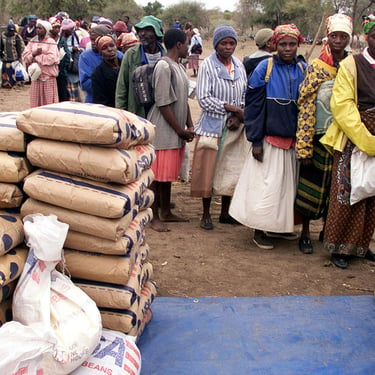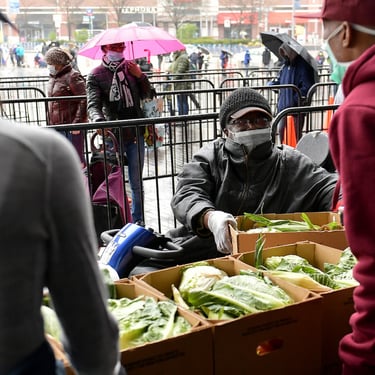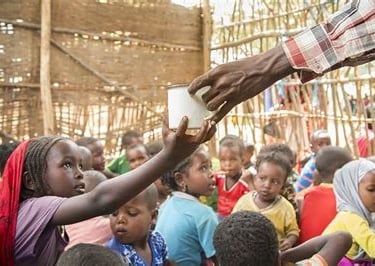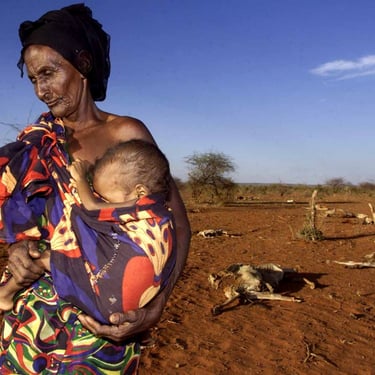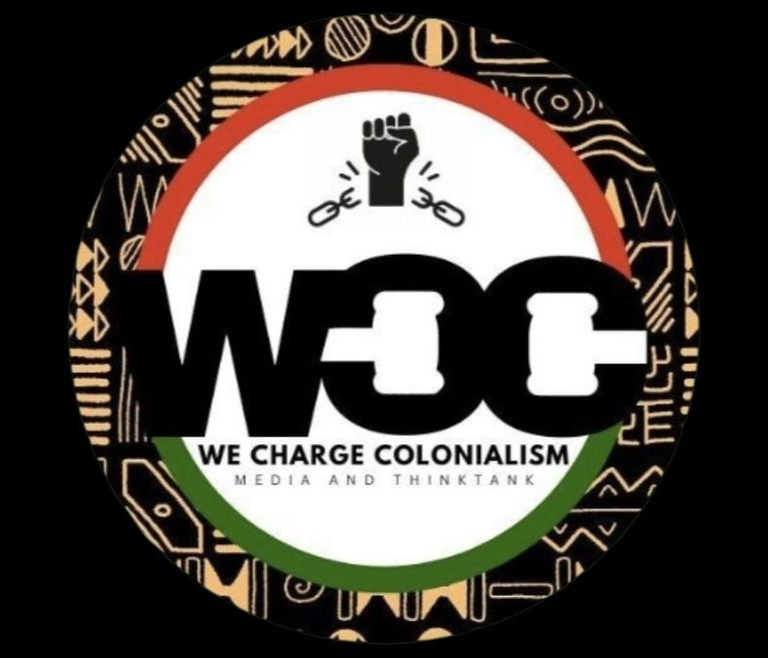Food Shortages or a Strategic Genocide?
Why Western Elites Are So On Code About a War Projected to Starve Millions
Important Questions to Ask:
What are the long-term plans of the European elites for Afrikans?
As millions of Afrikans seek to leave the Continent in an effort to evade the effects of European-lead globalism, will Europe’s immigration policy remain on the defensive, or is there an offensive alternative?
Do recent actions by the EU and the United States against Russia signal a change in policy where the consequences are far more deadly?
Even before the global crises caused by the Ukraine-Russia War and the Covid-19 Pandemic, the global elite did not hold back on letting us know how they viewed the rising Afrikan global population. The British monarchy’s Prince William while speaking at a wildlife conservationist gala publically derided Afrikans for having too many children, and thus overburdening the planet:
“The increasing pressure on Africa’s wildlife and wild spaces as a result of human population presents a huge challenge for conservationists, as it does the world over… in my lifetime we have seen global wildlife populations decline by over half. Africa’s rapidly growing human population is predicted to more than double by 2050 — a staggering increase of three and a half million people per month. There is no question that this increase puts wildlife and habitat under enormous pressure.”
A willfully blind statement, given no greater destruction to wildlife exists than European imperialist expansionism and exploitation of indigenous lands. Still, Prince William is far from the first of the globalist elite to expose this sentiment, particularly as Europe sees an influx of Afrikan migration as conditions worsen. Bill Gates, another European philanthropist, has frantically sounded an alarm on the supposed crisis of Afrika’s population growth. His foundation has poured millions of dollars into providing contraception to Afrikan women, which he states is the solution to population control. “The biggest things are the modern tools of contraception,” Gates said. “If you have those things available then people have more control over being able to space their children.”
Additionally, European governments have swiftly implemented anti-immigration policies to shelter themselves from the effects of European colonialism. In 2020, the EU unveiled its “Migration Pact” where European countries work with Libyan authorities to capture Afrikan migrants at sea and send them to Libya where they face enslavement, torture and grotesque abuse by Libyan authorities. Just recently, Britain made a similar pact with Rwanda to send all undocumented migrants to Rwanda, even while welcoming Ukrainian refugees with open arms.
Enter food shortages. Following the Covid-19 Pandemic, and now with the consequences of the Ukraine-Russia war, the Western world is continuing to set itself apart from the system of globalism it created to become relatively self-sustaining without due notice to the regions of the world that have become all dependent on the continued functioning of the globalist system. As a result, the Global South largely and Afrika in particular are poised to face the possibility of starvation as the world system faces inevitable collapse.
Ukraine and Russia are the world’s major wheat and corn exporters. The USA and Europe knowing this fact openly provoked a conflict with these two nations by floating the idea of Ukraine joining NATO, knowing very well Russia’s past warnings that such actions would be crossing a hard redline. Then, to worsen the situation, after Russia invaded Ukraine the USA and EU sanctioned Russia to oblivion, using every means possible to isolate a world power the world depended on for grain supplies and other food-related exports such as oil and gas.
It’s important to emphasize this point. These countries knew exactly what they were doing and exactly what the consequences would be, both domestically and internationally. They made their decision fully aware that not only would prices drastically increase, especially for the world’s poorest but that hundreds of millions of people would inevitably starve the longer the conflict and sanctions persisted.
While the world has been debating the invasion and feeling the overwhelming impacts of inflation, the West has been quietly taking actions to lessen the impact felt on their own citizens, particularly those who could afford to pay. Farms in the USA have been encouraged by the federal government to plant new crops on 4 million acres of land currently unused in the long-term Conservation Reserve Program as a means to feed more Americans. The EU also has launched a new initiative where $550 million (500 million euros) in agricultural aid could be used by EU members to help farmers boost food supplies. However, for the poorest in these countries, which are disproportionately Afrikan, there’s certainly little to no guarantee that they will be the beneficiaries of this food nationalism. Just in the US, the average price of food in March went up 10% from a year ago. America’s most needy families have been turning to food banks, forcing programs nationwide to ration supplies and cut services. It is estimated that in America 30 million adults and 12 million children are now living in food-insecure households. We know statistically that these groups are disproportionately Black.
Most of the Western world, however, has been told they have no reason to panic. As we can see from the relative self-sustainability maintained by the West, preparations for the failure of globalization have been built into the national infrastructures of European nations. “The EU is largely self-sufficient for key agricultural products, being a main wheat and barley exporter and largely able to cover its consumption for other staple crops such as maize or sugar… the EU is also largely self-sufficient for animal products, including dairy and meat…” Similarly, American food experts have projected that although prices will continue to rise, food shortages are unlikely to significantly hit the US, instead it’s been projected that “poorer nations will bear the brunt of the impact.”
So who is the United Nations speaking of when the UN food chief warned recently that we are headed toward “a catastrophe on top of a catastrophe” and will have a global impact “beyond anything we’ve seen since World War II?” Of course, they mean the “third world” and most significantly to be felt by Afrikan nations due to the level of dependency on food imports and food aid.
Afrika’s problems are twofold. One, the continent for decades has become accustomed to being the greatest recipient of Western food aid. Two, despite being the continent with the most arable land, Afrika has been fully drawn into the system of globalization in a relationship where Afrika is not the producer of many basic goods, but rather the importer of domestic products and an exporter of raw materials. For example, “Nigeria, the world’s fourth-largest wheat importer, receives a fourth of its imports from Russia and Ukraine. Cameroon, Tanzania, Uganda, and Sudan source more than 40 percent of their wheat imports from Russia and Ukraine.” Therefore, a lapse in the food global supply chain will not affect Europe or the US, who have maintained a sustainable degree of production even while engaging in the globalist system as it will Afrika and other food-dependent countries.
Unfortunately, this crisis has been a long time coming:
“For decades, many regions in the global south – such as Africa – have tailored their agricultural systems to exports. Rather than self-sufficiency, the agricultural system promoted exporting commodities like cocoa and coffee that prioritised foreign exchange over the development of a robust domestic food market. As long as world market prices for staple foods were low, and those for commodities high, the temptation to follow such a strategy was strong.
But it turned out to have tragic consequences. While it allowed the middle classes in Africa to access cheap food on the world market, it was at the price of widespread poverty, rural hunger, and massive migration to cities.”
Already, charities and NGOs are sounding the alarm that due to supply chain shortages, they will be unable to meet their usual demands for food supplies for the world’s poor. The United Nations for example claimed to have been feeding 125 million people around the world before Russia’s invasion of Ukraine but has started cutting their rations. The World Food Program, which buys 50% of its grain from Ukraine has now reversed course to providing a million people inside Ukraine with food now, as one official remarked “the World Food Program is taking food from hungry children to give to starving children.” The numbers projected to go hungry are staggering. In West Afrika, it is projected that 40 million Afrikans will go hungry if nothing is done. 20 million Afrikans are at risk of starvation in East Afrika as extreme weather conditions compounded with the Ukraine-Russia war has devastated those nations.
Interesting enough, the trending push for more development for visual stimulation, such as luxury high rises and skyscrapers instead of development of sustainability and food independence plays a major role in today’s food dependency crisis:
“The development donor community was partly to blame, to be sure. For a long time, it preached that state investment in agricultural extension services was absurd, and pushed governments to withdraw from rural development as part of its structural adjustment programs.”
At this point Afrika has two choices: change now and leave this western system of globalization or face irreversible consequences to its most vulnerable. All is not lost. With drastic action, Afrika stands the chance to reverse course and become internally focused Continent-wide. However, such a policy will require total abandonment of the rules set in place by the WTO, World Bank, IMF and other lending institutions which put controlling and anti-protectionist stipulations on loans. On a community level, we have to make food sovereignty a top focus and see to it that communal usage of land is of paramount concern for any land occupation or accumulation. The bottom line is it cannot be forgotten, the consequences, if we do not act quickly, could be violent and unbearable poverty followed by starvation and death that we as a people have never seen before.
Even without an admission from the globalists, given the causal reality of their actions we are in the position to ascertain that the end result of dependency and reliance on this global system is an intentional genocide meant to eradicate us from the scene before Europe is forced to reckon with its many crimes against Afrikan people and all humanity. The only question left to answer is what will Afrikans do about it.
[1] Hillary Essein, Africans need to stop reproducing to save wildlife: Prince William, (Nov. 24, 2021) https://gazettengr.com/africans-need-to-stop-reproducing-to-save-wildlife-prince-william/
[2] World Economic Forum, Bill Gates has a warning about population growth, https://www.weforum.org/agenda/2018/09/africas-rapid-population-growth-puts-poverty-progress-at-risk-says-gates
[3] Amnesty International, (Sept. 24, 2020) https://www.amnesty.org/en/latest/news/2020/09/libya-new-evidence-shows-refugees-and-migrants-trapped-in-horrific-cycle-of-abuses/
[4] Reuters, U.S. farm groups urge sowing on protected land as war cuts off Ukraine supply, US News, (Mar. 23, 2022) https://money.usnews.com/investing/news/articles/2022-03-23/u-s-farm-groups-urge-sowing-on-protected-land-as-war-cuts-off-ukraine-supply
[5] Chuck Abbott, EUROPE TO TILL FALLOW LAND TO OFFSET FOOD SHORTAGES FROM WAR IN UKRAINE, (Mar. 24, 2022) https://www.agriculture.com/news/business/europe-to-till-fallow-land-to-offset-food-shortages-from-war-in-ukraine
[6] Opinion: Millions more Americans will go hungry if Congress doesn't act soon, (Apr. 26, 2022) https://www.wicz.com/story/46371999/opinion-millions-more-americans-will-go-hungry-if-congress-doesnt-act-soon
[7] Natasha Foote, EU food supply will remain secure, but less accessible for Europe’s poorest, (Mar. 25, 2022) https://www.euractiv.com/section/agriculture-food/news/eu-food-supply-will-remain-secure-but-less-accessible-for-europes-poorest/
[8] Opinion: Millions more Americans will go hungry if Congress doesn't act soon, (Apr. 26, 2022)https://www.politifact.com/article/2022/apr/18/looming-food-shortages-probably-not-us/
[9] The War in Ukraine Is Creating the Greatest Global Food Crisis Since WWII, the U.N. Says, https://time.com/6162598/ukraine-war-food-shortage/
[10] Human Rights watch, Ukraine/Russia: As War Continues, Africa Food Crisis Looms, (Apr. 28, 2022) https://www.hrw.org/news/2022/04/28/ukraine/russia-war-continues-africa-food-crisis-looms#
[11] Stefan SchmitzVoices: Food prices are on the rise – and the global south will be hit hardest, The Independent, (Apr. 24, 2022) https://news.yahoo.com/voices-food-prices-rise-global-151237748.html?bingParse
[12] Time Magazine, Ukraine War Threatens to Cause a Global Food Crisis, (Mar. 30, 2022) https://time.com/6162598/ukraine-war-food-shortage/
[13] DW, West Africa food insecurity at worst level in 10 years — report, https://www.dw.com/en/west-africa-food-insecurity-at-worst-level-in-10-years-report/a-61368564
[14] Aljazeera, WFP: 20 million risk starvation as Horn of Africa drought worsens, (Apr. 19, 2022) https://www.aljazeera.com/news/2022/4/19/20-million-risk-starvation-as-horn-of-africa-drought-worsens-un
[15] Stefan Schmitz, Voices: Food prices are on the rise – and the global south will be hit hardest, The Independent, (Apr. 24, 2022) https://news.yahoo.com/voices-food-prices-rise-global-151237748.html?bingParse
